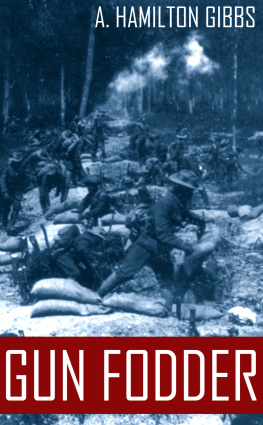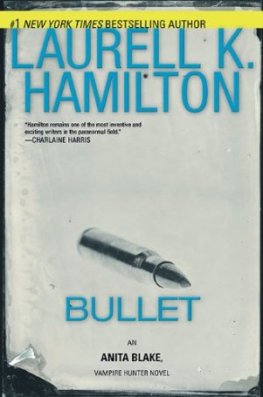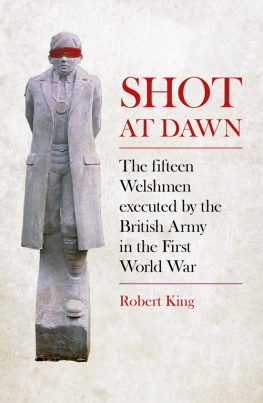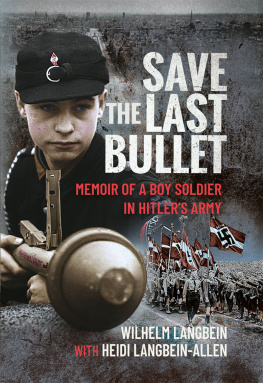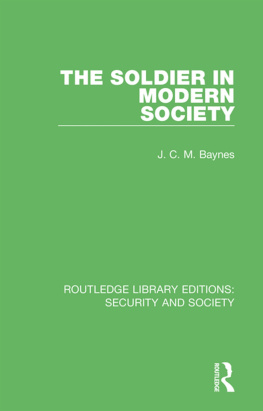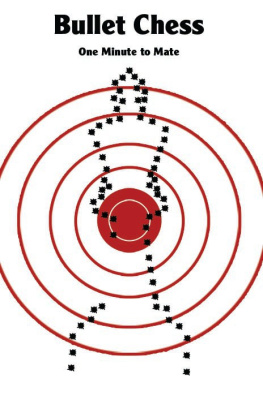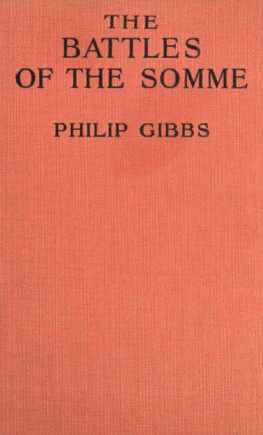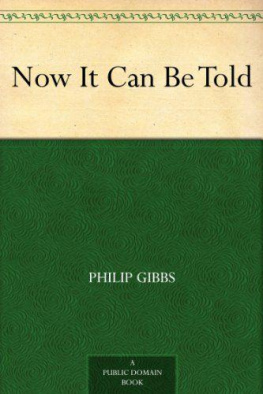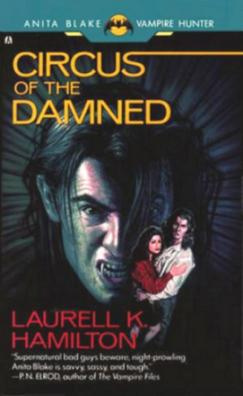
GUN FODDER
THE DIARY OF FOUR YEARS OF WAR
BY
A. HAMILTON GIBBS
MAJOR, R.A.
WITH INTRODUCTION BY PHILIP GIBBS
1919
COPYRIGHT 2014 BIG BYTE BOOKS
Get more great reading from BIG BYTE BOOKS
Get your FREE EBOOK join our mailing list to get notified of great new (old) books and the latest blog posts.
BIG BYTE BOOKS is your source for great lost history!
2014 PREFACE
He was a born solider. His superiors said so. Men followed him willingly to do things he hated doing. In the tradition of T.E. Lawrence (of Arabia) and poet Robert Graves is A. Hamilton Gibbs classic World War I memoir of his time in service to king and country. With humor, intelligence, sorrow, and bitterness he, in his brothers words, truthfully, nakedly, vividly, [reveals] the experience not only of one soldier in the British Army, but of thousands, and hundreds of thousands.
A writer before the war, Major Gibbs spoke for a generation when he penned this contribution to war literature. The catastrophe of the war to end all wars created the Lost Generation and helped spawn the excess and abandon of the Roaring Twenties. Some, like Gibbs and Robert Gray, went on to build careers. Other, like T.E. Lawrence, seemed never to shake the terrible toll the war had taken on their psyches.
Arthur Hamilton Gibbs was born in 1888. He was Oxford-educated and studied at the Collge de St Malo in Brittany, France. He was the younger brother of the war correspondent, Philip Gibbs, and in 1914 the younger Gibbs enlisted in the British cavalry. Later, he trained with a division of field artillery for service in Egypt and in Salonica He was invalided home in 1916 but in the spring of 1917 went to the Western Front with a field battery. By 1918, a Major decorated with the military cross, he was in the retreat to the Marne. During the Allied advance Major Gibbs was gassed and put out of the fight.
INTRODUCTION
THERE seems no reason to me why I should write a preface to my brothers book except that I have been, as it were, a herald of war proclaiming the achievements of Knights and men-at-arms in this great conflict that has passed, and so may take up my scroll again on his behalf, because here is a good soldier who has told, in a good book, his story of most disastrous chances of moving accidents by flood and field; of hair-breadth scapes the imminent-deadly breach.
That he was a good soldier I can say not because my judgment is swayed by brotherly partiality, but because I saw him at his job, and heard the opinions of his fellow officers, which were immensely in his favor. Your brother is a born soldier, said my own Chief who was himself a gallant officer and had a quick eye for character. I think that was true. The boy whom once I wheeled in a go-cart when he was a shock-headed Peter and I the elder brother with a sense of responsibility towards him, had grown up before the war into a strong man whose physical prowess as an amateur pugilist, golfer, archer (in any old sport) was quite outside my sphere of activities, which were restricted to watching the world spin round and recording its movements by quick penmanship. Then the war came and like all the elder brothers of England I had a quick kind of heart-beat when I knew that the kid brother had joined up and in due time would have to face the music being played by the great orchestra of death across the fields of life.
I saw the war before he did, knew the worst before he guessed at the lesser evils of it, heard the crash of shell fire, went into burning and bombarded towns, helped to carry dead and wounded, while he was training in England under foul-mouthed sergeants training to learn how to fight, and, if need be, how to die, like a little gentleman. But I from the first was only the onlooker, the recorder, and he was to be, very quickly, one of the actors in the drama, up to his neck in the real thing. His point of view was to be quite different from mine. I saw the war in the mass, in its broad aspects and movements from the front line trenches to the Base, from one end of the front to the other. I went into dirty places, but did not stay there. I went from one little corner of hell to another, but did not dwell in its narrow boundaries long enough to get its intimate details of hellishness burnt into my body and soul. He did. He had not the same broad vision of the business of war appalling in its vastness of sacrifice and suffering, wonderful in its mass-heroism but was one little ant in a particular muck-heap for a long period of time, until the stench of it, the filth of it, the boredom of it, the futility of it, entered into his very being, and was part of him as he was part of it. His was the greater knowledge.
He was the sufferer, the victim. Our ways lay apart for a long time. He became a ghost to me, during his long spell in Salonica, and I thought of him only as a ghost figure belonging to that other life of mine which I had known before the war, that far-off period of peace which seemed to have gone forever. Then one day I came across him again out in Flanders in a field near Armentieres, and saw how he had hardened and grown, not only in years but in thoughtfulness and knowledge. He was a commander of men, with the power of life and death over them. He was a commander of guns with the power of death over human creatures lurking in holes in the earth, invisible creatures beyond a hedge of barbed wire and a line of trench. But he also was under the discipline of other powers with higher command than his who called to him on the telephone and told him to do things he hated to do, but had to do, things which he thought were wrong to do, but had to do; and among those other powers, disciplining his body and soul was German gun-power from that other side of the barbed-wire hedge, always a menace to him, always teasing him with the chance of death, a yard this way, a yard that, as I could see by the shell-holes round about his gun-pits, following the track of his field-path, clustering in groups outside the little white house in which he had his mess. I studied this brother of mine curiously. How did he face all the nerve-strain under which I had seen many men break? He was merry and bright (except for sudden silences and a dark look in his eyes at times).
He had his old banjo with him and tinkled out a tune on it. How did he handle his men and junior officers? They seemed to like him this side idolatry , yet he had a grip on them, and demanded obedience, which they gave with respect. Queer! My kid-brother had learned the trick of command. He had an iron hand under a velvet glove. The line of his jaw, his straight nose (made straighter by that boxing in his old Oxford days) were cut out for a job like this. He looked the part. He was born to it. All his training had led up to this soldiers job in the field, though I had not guessed so when I wheeled him in that old go-cart.
For me he had a slight contempt, which he will deny when he reads this preface. Though a writer of books before the war, he had now the soldiers scorn of the chronicler. It hurt him to see my green arm-bands, my badge of shame. That I had a motorcar seemed to him, in his stationary exile, the sign of a soft job as, compared with his it was disgraceful in its luxury. From time to time I saw him, and, in spite of many narrow escapes under heavy shelling, he did not change, but was splendidly cheerful. Even on the eve of the great German offensive in March of 1918, when he took me to see the graves dug in under the embankment south of St. Quentin, he did not seem apprehensive of the awful ordeal ahead of him. I knew more than he did about that. I knew the time and place of its coming, and I knew that he was in a very perilous position. We said so long to each other at parting, with a grip of hands, and I thought it might be the last time I should see him. It was I think ten days later when I saw him, and in that time much had happened, and all that time I gave him up as lost. Under the overwhelming weight of numbers 114 Divisions to 48 the British line had broken, and, fighting desperately, day by day, our men fell back mile after mile with the enemy outflanking them, cutting off broken battalions, threatening to cut off vast bodies of men. Every day I was in the swirl of that Retreat, pushing up to its rearguards, seeing with increasing dismay the fearful wreckage of our organization and machine of war which became for a little while like the broken springs of a watch, with Army, Corps, and Divisional staffs entirely out of tune with the fighting units owing to -the break-down of all lines of communication. In that tide of traffic, of men, and guns, and transport, I made a few enquiries about that brother of mine. Nobody had seen, or heard of his battery. I must have been close to him at times in Noyon, and Guiscard and Ham, but one individual was like a needle in a bunch of hay, and the enemy had rolled over in a tide, and there did not seem to me a chance of his escape. Then, one morning, in a village near Poix, when I asked a gunner-officer whether he had seen my brothers battery, he said, Yes two villages up that road. Do you happen to know Major Gibbs? Yes... I saw him walking along there a few minutes ago.
Next page
